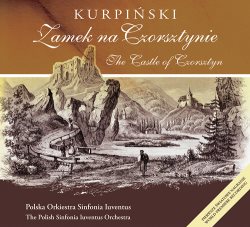| 
|
Karol KURPIŃSKI (1785-1857)
The Castle of Czorsztyn – comic opera in two acts
Aleksandra Orłowska-Jabłońska (soprano) – Wanda; Hubert Stolarski (tenor) – Bojomir; Jadwiga Niebelska (mezzo) – Łucja; Tomasz Raff (bass) – Nikita; Witold Żołądkiewicz (baritone) - Dobroslaw
Polish Sinfonia Iuventus Orchestra/Michał Niedziałek
rec. Witold Lutosławski Polish Radio Concert Studio, Warsaw, Poland, 3-5 December 2012.
World Première Recording
DUX 0955 [54:19]
Kurpinski was one of the most highly respected Polish composers before Chopin. He is credited with helping to establish a national style and in preparing the ground for Polish music’s romantic period. His contribution to Polish opera is recognised as significant by introducing new devices and means of expression.
Kurpinski received his first music lessons from his organist father and was appointed organist at the church in Sarnowa at the age of 12 by an uncle who was the town’s parish priest. When he was 15 his other uncle took him to Lviv to become a violinist in the orchestra of Count Feliks Polanowski where that uncle was cellist. After having composed his first opera in 1808 he moved to Warsaw in 1810 where he became conductor of Warsaw Opera, a post he held for thirty years. He became friends with Chopin (1810-1849) and was present in Chopin’s home during 1830 at the rehearsals of both piano concertos and the Fantasy in A major. He also conducted the young Chopin at his first public concerts the same year. There is evidence to suggest that Chopin was influenced to compose polonaises and mazurkas having heard Kurpinski’s own examples.
The Castle of Czorsztyn - or Bojomir and Wanda – is to a libretto by Józef Wawryniec Krasinski z Radziejowic. It received its first performance in 1819. The story is dotty as is often the case with operas and concerns a knight and his peasant attendant coming upon a castle in terrible weather and seeking shelter. It turns out to be where Lord Dobroslaw, the castle’s owner, lives with his daughter Wanda who went insane after her father had refused permission for her to marry the knight. Why the knight didn’t recognise it was that castle and why Dobroslaw did not recognise the knight is unclear. Eventually Wanda becomes aware of the knight’s presence, her sanity returns and the pair are reunited, this time with grateful agreement and many apologies for his past edict from Dobroslaw; all’s well that ends well. Yeah, right! An English translation is to be found in the accompanying booklet but it won’t help much as it is clumsy to say the least; example:
Nikita (the knight’s attendant):-
Observe master, the fears, the disgraces
Burly dames in undergarments
In front of smoky mirrors
Combing their straw coiffures
and later: Nikita referring to Wanda: Does she take me for a dog?
And I see, not one of the worst:-
Wanda: Who calls me?
Nikita: Slay me if I got that right.
You get the picture. However, when has an unconvincing story spoiled an opera; it is the music and the singing that are the most important elements and I was very impressed by both here. The overture is an extremely pleasant and effective example of early nineteenth century composition from the man who is beloved by Poles for being the composer of the Warszawianka, the battle hymn of the November Insurrection of 1830. The rest of the music is equally rewarding. The singing is exemplary and the sound is exceptionally clear with every word discernible. Despite my knowing only a few words in Polish my imperfect knowledge of Czech enabled me to pick out certain words. That wouldn’t be possible if the singer’s enunciation was not perfect and the sound correspondingly good. The fact that it is in Polish doesn’t detract from enjoyment as the simple story is easily followed. Add to that the excellent orchestral playing from an enthusiastic young orchestra made up of the most talented students and graduates from the country’s musical academies all of whom must be under thirty to join. Since its creation in 2007 it has chalked up considerable successes throughout Europe and during a trip to China and through a number of recordings including a set of the complete symphonies of Krzysztof Penderecki made in collaboration with the composer.
This short opera would require relatively simple staging and sets and with only five soloists would be an altogether cost-effective production. I could imagine an opera festival such as Wexford, renowned for its staging of either obscure or at best rarely performed operas, putting this on to great success and creating an interest that may encourage other companies to try it out. It is worthy of being seen and heard. I hope that this world premičre recording will spark a reaction in the right quarters.
Steve Arloff
 |
 |
|



 All Nimbus reviews
All Nimbus reviews








